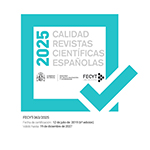The "Frauenproblem" and the reflection on motherhood during the Weimar Republic and the National Socialism through the work of Alice Rühle-Gerstel
Abstract
One of the direct consequences of National Socialism in Germany was the exclusion of certain feminist authors who for decades had been reflecting on "the second sex", the "feminine question" or "the woman problem"(Das Frauenproblem). One of them is Alice Rühle-Gerstel, born in Prague in 1894, based in Germany during the Weimar Republic, and who finally committed suicide in 1943 in Mexico City during her political exile that started in 1936. The importance of this author lies in the possibility of tracing through her work not only the intellectual and cultural environment linked to feminism in the German-speaking countries during the first half of the 20th century, but also the debates and discussions around the topics of "woman" and "motherhood". Her contributions and foray into the feminism of the early twentieth century will be addressed considering her interdisciplinary reflection and the theoretical tools that both the Individual Psychology of Alfred Adler and the Historical Materialism of Karl Marx provided. Based on the latter, it can be concluded that the work of Alice Rühle-Gerstel was a pioneering one in analyzing and reflecting on the situation of women in the German speaking space. In addition, this work offers the general context in which Rühle-Gerstel´s thought first developed during the time of the Weimar Republic, and afterwards suffered censorship and finally fell into oblivion subject to the rise of National Socialism.
Downloads
Article download
License
In order to support the global exchange of knowledge, the journal Investigaciones Feministas is allowing unrestricted access to its content as from its publication in this electronic edition, and as such it is an open-access journal. The originals published in this journal are the property of the Complutense University of Madrid and any reproduction thereof in full or in part must cite the source. All content is distributed under a Creative Commons Attribution 4.0 use and distribution licence (CC BY 4.0). This circumstance must be expressly stated in these terms where necessary. You can view the summary and the complete legal text of the licence.











